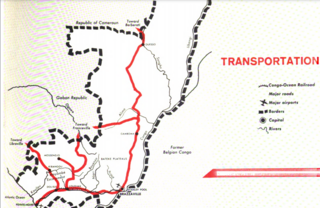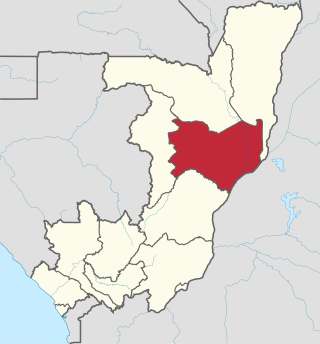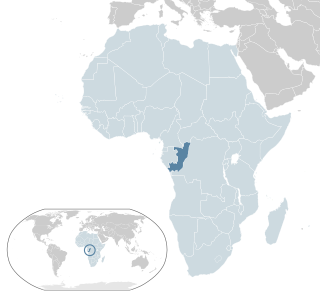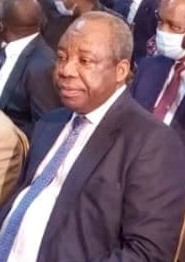
The Republic of the Congo is located in the western part of central Africa, on the Equator. Congo has several important ports. The Republic of the Congo covers an area of 342,000 km², of which 341,500 km² is land while 500 km² is water. Congo claims 200 nautical miles (370 km) of territorial sea.

Transport in the Republic of Congo includes land, air and water modes. Over 3,000 km (1,900 mi) of paved roads are in use. The two international airports are Maya-Maya Airport and Pointe Noire Airport.

Kinshasa, formerly named Léopoldville until 30 June 1966, is the capital and largest city of the Democratic Republic of the Congo. Once a site of fishing and trading villages along the Congo River, Kinshasa is now one of the world's fastest-growing megacities. Kinshasa's 2024 population was estimated at 17,032,322. It is the most densely populated city in the DRC, the most populous city in Africa, the world's fourth-most-populous capital city, Africa's third-largest metropolitan area, and the leading economic, political, and cultural center of the DRC. Kinshasa houses several industries, including manufacturing, telecommunications, banking, and entertainment. The city also hosts some of DRC's significant institutional buildings, such as the Palais du Peuple, Palais de la Nation, Court of Cassation, Constitutional Court, Cité de l'Union Africaine, Palais de Marbre, Stade des Martyrs, Immeuble du Gouvernement, Kinshasa Financial Center, and multiple federal departments and agencies.

Brazzaville is the capital and largest city of the Republic of the Congo. Administratively, it is a department and a commune. Constituting the financial and administrative centre of the country, it is located on the north side of the Congo River, opposite Kinshasa, the capital city of the Democratic Republic of the Congo.

Cuvette is a department of the Republic of the Congo in the central part of the country. It borders the departments of Cuvette-Ouest, Likouala, Plateaux, and Sangha, and internationally, the Democratic Republic of the Congo. The capital is Owando. Cities and towns include Boundji, Makoua and Okoyo.

Pointe-Noire is the second largest city in the Republic of the Congo, following the capital of Brazzaville, and an autonomous department and a commune since the 2002 Constitution. Before this date it was the capital of the Kouilou region. It is situated on a headland between Pointe-Noire Bay and the Atlantic Ocean. Pointe-Noire is the main commercial centre of the country and has a population of 1,420,612 inhabitants in 2023.

Ouésso is a town and commune in the Ouésso District in northern Republic of the Congo at the border of Cameroon, lying on the Sangha River and surrounded by rainforest. It is the capital of the Sangha Department.
Owando is a town and a commune located in the central Republic of the Congo lying on the Kouyou River. It is the capital of Cuvette Department and of Owando District. It is home to a market and has an airport.
Sibiti is a town and a commune located in the Lékoumou department of the Republic of the Congo 300 km west of Brazzaville. It is also the department's capital and Sibiti District seat.

The Departments of the Republic of the Congo are divided into 86 districts and 6 communes; which are further subdivided into urban communities and rural communities ; which are further subdivided into quarters or neighborhoods (quartiers) and villages. Note the departments of Brazzaville and Pointe-Noire are made of 1 commune each, then divided in urban districts (arrondissements).

The Second Republic of the Congo Civil War, also known as the Second Brazzaville-Congolese Civil War, was the second of two ethnopolitical civil conflicts in the Republic of the Congo which lasted from 5 June 1997 to 29 December 1999. The war served as the continuation of the civil war of 1993–1994 and involved militias representing three political candidates. The conflict ended following the intervention of the Angolan military, which reinstated former president Denis Sassou Nguesso to power.

The following outline is provided as an overview of and topical guide to the Republic of the Congo:

Congo, officially the Republic of the Congo or Congo Republic, also known as Congo-Brazzaville, is a country located on the western coast of Central Africa to the west of the Congo River. It is bordered to the west by Gabon, to the northwest by Cameroon, to the northeast by the Central African Republic, to the southeast by the Democratic Republic of the Congo, to the south by the Angolan exclave of Cabinda, and to the southwest by the Atlantic Ocean.
Antoine Ndinga Oba was a Congolese diplomat, political figure, and linguist. During the single-party rule of the Congolese Labour Party (PCT), he served in the government of Congo-Brazzaville as Minister of National Education from 1977 to 1984 and as Minister of Foreign Affairs from 1984 to 1991. Later, he was Congo-Brazzaville's Ambassador to UNESCO from 1998 until his death in 2005.

Pierre Moussa is a Congolese politician who has been President of the Commission of the Economic and Monetary Community of Central Africa since 2012. He served in the government of Congo-Brazzaville as Minister of Planning from 1979 to 1991; later, he was Minister of Spatial Planning from 1997 to 2002, Minister of Planning from 2002 to 2009, and Minister of State for the Economy and Planning from 2009 to 2012.

Gilbert Ondongo is a Congolese politician who has served in the government of Congo-Brazzaville as Minister of State for the Economy, Industry and Public Finances since 2017. Previously he was Minister of Labour from 2005 to 2009, and Minister of Finance from 2009 to 2016.

The Republic of the Congo includes 16 communes, some divided in urban boroughs (arrondissements) and in quarters.

The Republic of the Congo faces a number of ongoing health challenges.
The following is a timeline of the history of the city of Brazzaville, Republic of the Congo.

Kintélé is a town in the north-eastern suburbs of Brazzaville established as a commune in 2017 and located in southern Republic of Congo in the Ignié District of the Pool Department.















